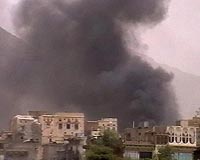| . |  |
. |
Beirut, Lebanon (UPI) Nov 2, 2009 A jihadist group suspected of having links to al-Qaida has claimed responsibility for a fumbled rocket attack against Israel from South Lebanon on Oct. 27, the fifth such attack this year. The claim on an Islamic Web site by the little-known group calling itself the Battalions of Ziad Jarrah, a Lebanese who was one of the Sept. 11, 2001, suicide hijackers, has not been verified independently since it was posted Oct. 29. But it has heightened growing concerns in the region that jihadist groups are establishing themselves in Lebanon and the Hamas-controlled Gaza Strip to launch attacks on Israel at a time when U.S. President Barack Obama is pushing hard to revive the long-stalled Arab-Israeli peace process. The group has claimed responsibility for a Sept. 11 rocket attack on northern Israel. It said the Oct. 27 attack was in retaliation for Israel's crackdown on stone-throwing Palestinians protesting the presence of hard-line Israeli settlers around the Al Aqsa Mosque in Jerusalem, Islam's third-holiest shrine. The Battalions of Ziad Jarrah is a branch of the Abdullah Azzam Brigade named after a Palestinian militant who was Osama bin Laden's mentor in Afghanistan before al-Qaida was established. Azzam was assassinated in Pakistan with his two sons Nov. 24, 1989. The Abdullah Azzam Brigades claimed responsibility for deadly bombings in Egypt in 2005 that killed dozens of people. In a separate development, Lebanese military intelligence reported the capture of Fadi Ghassan Ibrahim, aka Sikamo, wanted for several bombings and setting up "terrorist cells." Lebanese newspapers said he was linked to Abdelrahman Awad, a Palestinian jihadist and veteran of the Iraqi insurgency who heads Fatah al-Islam, another group with ideological connections to al-Qaida. It fought a three-month battle with the Lebanese Army in the Nahr al-Bared refugee camp in the northern port city of Tripoli in 2007 in which 400 people were killed, including 171 soldiers. The militants were eventually crushed after fierce fighting, but they have since been regrouping in North Lebanon as well as the sprawling Ein al-Hilweh camp in the southern city of Sidon. Lebanese security sources said that Ibrahim was arrested Oct. 30 after he was lured out of Ein el-Hilweh, where Lebanese security forces do not venture. He is suspected of masterminding and participating in attacks against U.N. peacekeepers in South Lebanon and that he headed Fatah al-Islam's bombing and rocket operations in the region. Six Spanish peacekeepers were killed in the worst attack in June 2007. Ten days before Ibrahim was captured, an investigating judge indicted 21 suspected members of Fatah al-Islam for bombings in Tripoli in August and September that killed 25 people, mostly Lebanese soldiers. In September Lebanese security forces reportedly thwarted a plan to assassinate the country's most prominent Sunni cleric, Grand Mufti Sheik Mohammed Rashid Qabbani in downtown Beirut. Jihadists were blamed for the attack, which official sources said involved an assassin with explosives hidden inside his body to evade detection who would detonate them when he was close to the grand mufti. That was identical to a failed al-Qaida attempt in August to assassinate a Saudi prince who heads the counterinsurgency forces that crushed an al-Qaida campaign in the kingdom. These two events, several weeks apart, have suggested that al-Qaida and its affiliates plan targeted assassinations of leading personalities in the Muslim world using close-in suicide bombers. Meantime, jihadist cells have been reported to be proliferating in the Gaza Strip, despite Hamas' efforts to crush them. Among the most significant groups are Jund Ansar Allah (Soldiers of the Companions of God), Jaish al-Islam (Army of Islam), and Jaish al-Umma (Army of the Nation). Fatah al-Islam is also reported to taking root in Gaza, with at least 120 operatives organized in cells. Jund Ansar Allah claimed a series of bombings and other attacks on Hamas' Executive Force security unit in September after Hamas stormed one of its strongholds in August. More than 20 people were killed, including the group's leader, a radical preacher named Abel Latif Khaled Mohammed Moussa.
Share This Article With Planet Earth
Related Links
 Saudis being dragged into Yemen war
Saudis being dragged into Yemen warSanaa, Yemen (UPI) Oct 29, 2009 Slowly but surely, Saudi Arabia, which has traditionally shied away from conflict in favor of diplomacy and buying its way out of trouble, is being dragged into the Middle East's conflicts as a participant. It's happening in Iraq and Iran, but right now the main hotspot is Yemen, the poorest country on the Arabian peninsula, wracked by tribal insurrection, southern secessionists and a ... read more |
|
| The content herein, unless otherwise known to be public domain, are Copyright 1995-2009 - SpaceDaily. AFP and UPI Wire Stories are copyright Agence France-Presse and United Press International. ESA Portal Reports are copyright European Space Agency. All NASA sourced material is public domain. Additional copyrights may apply in whole or part to other bona fide parties. Advertising does not imply endorsement,agreement or approval of any opinions, statements or information provided by SpaceDaily on any Web page published or hosted by SpaceDaily. Privacy Statement |